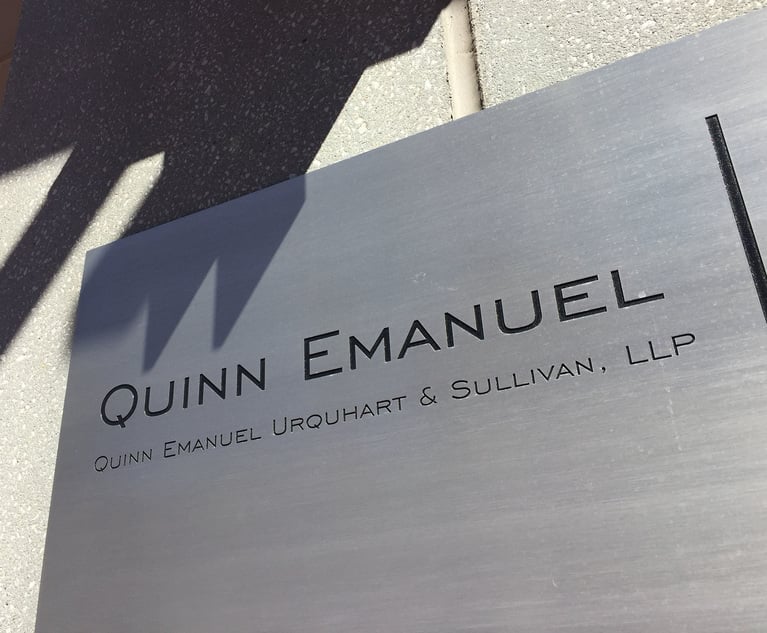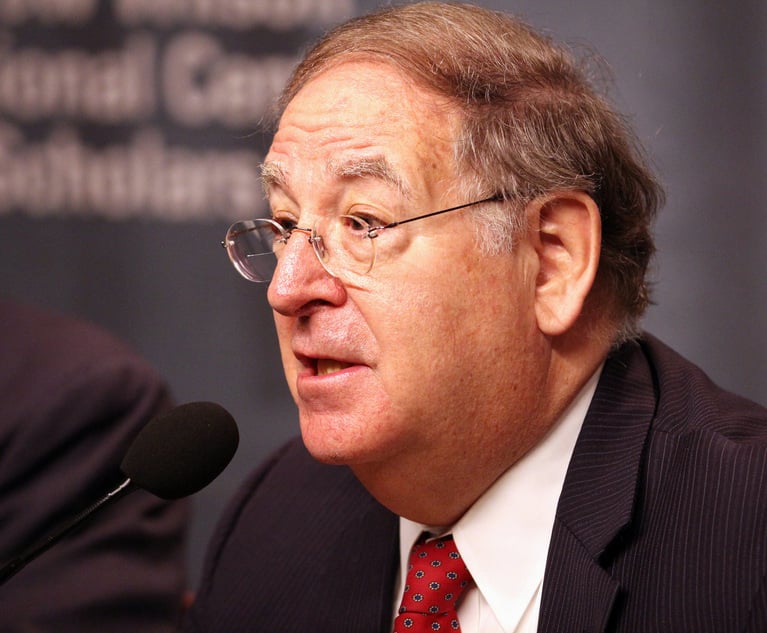Judge Appoints Special Master in Flint Water Contamination Case
A federal judge in Michigan has refused to remove lead attorneys in the Flint water contamination case but plans to bring in a special master to review their fees and expenses.
June 20, 2018 at 05:10 PM
5 minute read
 Bottled water distribution by National Guard at Fire Station No. 6 in downtown Flint, Michigan, Jan. 23, 2016. Photo: Linda Parton/Shutterstock.com
Bottled water distribution by National Guard at Fire Station No. 6 in downtown Flint, Michigan, Jan. 23, 2016. Photo: Linda Parton/Shutterstock.com
A federal judge in Michigan has refused to remove lead attorneys in the Flint water contamination case but plans to bring in a special master to review their fees and expenses.
In an order on Tuesday, U.S. District Judge Judith Levy in Ann Arbor refused to grant a motion brought by Ted Leopold and Michael Pitt, co-lead counsel for a consolidated class action, to remove Hunter Shkolnik from his post as co-liaison counsel to the individual cases. They claimed Shkolnik was luring prospective class members into signing illegal retainer agreements with his firm, New York-based Napoli Shkolnik.
Shkolnik fired back with his own motion to remove Leopold, of Cohen Milstein Sellers & Toll in Palm Beach Gardens, Florida, and Pitt, of Pitt McGehee Palmer and Rivers in Royal Oak, Michigan. In his motion, Shkolnik called the action to remove him a “blatant money grab” and requested the court name a special master to review submissions to the common benefit fund, which goes to lead plaintiffs attorneys who work on contingency fee for the class.
Levy's decisions to reject the motions from all sides left the Flint leadership team intact. Following a hearing on Monday, she didn't outline her reasons for denying the motions.
But she placed term limits on her leadership appointments. All of the appointments are set to expire on Dec. 31, although they may apply for reappointment. Those applications must be filed by Nov. 16 under the court order.
Levy also said she planned to bring in Deborah Greenspan, a partner at Blank Rome in Washington, D.C., to serve as special master.
Greenspan was special master in a settlement program involving Vietnam War veterans exposed to Agent Orange. A former law partner of Kenneth Feinberg, she also was deputy special master for the 9/11 victim compensation fund. Greenspan, who joined Blank Rome from Dickstein Shapiro in 2016, became the focus of an audit last year by the U.S. Department of Justice Office of the Inspector General. The report raised concerns about a potential conflict of interest Greenspan might have after the Sept. 11 fund gave more than $3.6 million worth of contracts to her law firms.
In her order, Levy wrote that the special master would handle time and expense administration, coordinate with lawyers in other cases and handle discovery matters “as needed.” She ordered all objections or “potential reasons for Ms. Greenspan's disqualification” be filed by July 2.
In a separate time and expense order, she required lawyers to submit their records monthly to the special master. She also ordered that the special master audit the common benefit fund on a quarterly basis.
“We are happy with Judge Levy's denial of the motion to replace me and look forward to working with the special master she appoints in the implementation of time and expense order,” Shkolnik said. “Clearly my dogged pursuit to rein in class counsels' billing practices was the impetus of the motion against me and now this has been taken care of.”
Shkolnik, whose firm has represented 9/11 victims, said he supported Greenspan as special master.
Greenspan did not respond to a request for comment. Leopold and Pitt also did not respond.
The lawsuits target engineering firms and more than a dozen government officials over the 2014 decision to shift the city's water supply from Lake Huron to the Flint River, despite studies warning the corrosive nature of the river could risk lead getting into the drinking water supply.
Last summer, Levy appointed Pitt and Leopold as lead counsel for all the class actions in federal court, and Shkolnik and Corey Stern, of Levy Konigsberg, as co-liaison for hundreds of individual cases, most of which involve medical claims. The lawyers have filed separate complaints, but many of their allegations overlap.
The dispute arose as both sides are meeting with two mediators, one of whom is former U.S. Sen. Carl Levin, D-Michigan.
On March 12, Leopold and Pitt filed a motion to remove Shkolnik, alleging he swiped their clients while demanding that he and Stern get 40 percent of a potential common benefit fund, plus their contingency fees.
Shkolnik, in his own motion, said Leopold and Pitt had their own demands, which would have netted them 80 percent of common benefit fees. They also had “secret side-fee deals” with other law firms, he said.
Even one of the defendants, Veolia North America, weighed in with concerns about how all three lawyers were communicating with potential class members.
Stern called on both sides to reach a truce for the sake of the Flint litigation.
This content has been archived. It is available through our partners, LexisNexis® and Bloomberg Law.
To view this content, please continue to their sites.
Not a Lexis Subscriber?
Subscribe Now
Not a Bloomberg Law Subscriber?
Subscribe Now
NOT FOR REPRINT
© 2025 ALM Global, LLC, All Rights Reserved. Request academic re-use from www.copyright.com. All other uses, submit a request to [email protected]. For more information visit Asset & Logo Licensing.
You Might Like
View All
Trump Administration Faces Legal Challenge Over EO Impacting Federal Workers
3 minute read
Private Equity Giant KKR Refiles SDNY Countersuit in DOJ Premerger Filing Row
3 minute read
Quinn Emanuel Files Countersuit Against DOJ in Row Over Premerger Reporting
3 minute read
'Thoughtful Jurist': Maryland US District Senior Judge Messitte Dies After Short Illness
4 minute readTrending Stories
- 1Am Law 200 Firms Announce Wave of D.C. Hires in White-Collar, Antitrust, Litigation Practices
- 2K&L Gates Files String of Suits Against Electronics Manufacturer's Competitors, Brightness Misrepresentations
- 3'Better of the Split': District Judge Weighs Circuit Divide in Considering Who Pays Decades-Old Medical Bill
- 4Which Georgia Courts Are Closed Today?—Here's a List
- 5After DEI Rollbacks, Employment Lawyers See Potential For Targeting Corporate Commitment to Equality
Who Got The Work
J. Brugh Lower of Gibbons has entered an appearance for industrial equipment supplier Devco Corporation in a pending trademark infringement lawsuit. The suit, accusing the defendant of selling knock-off Graco products, was filed Dec. 18 in New Jersey District Court by Rivkin Radler on behalf of Graco Inc. and Graco Minnesota. The case, assigned to U.S. District Judge Zahid N. Quraishi, is 3:24-cv-11294, Graco Inc. et al v. Devco Corporation.
Who Got The Work
Rebecca Maller-Stein and Kent A. Yalowitz of Arnold & Porter Kaye Scholer have entered their appearances for Hanaco Venture Capital and its executives, Lior Prosor and David Frankel, in a pending securities lawsuit. The action, filed on Dec. 24 in New York Southern District Court by Zell, Aron & Co. on behalf of Goldeneye Advisors, accuses the defendants of negligently and fraudulently managing the plaintiff's $1 million investment. The case, assigned to U.S. District Judge Vernon S. Broderick, is 1:24-cv-09918, Goldeneye Advisors, LLC v. Hanaco Venture Capital, Ltd. et al.
Who Got The Work
Attorneys from A&O Shearman has stepped in as defense counsel for Toronto-Dominion Bank and other defendants in a pending securities class action. The suit, filed Dec. 11 in New York Southern District Court by Bleichmar Fonti & Auld, accuses the defendants of concealing the bank's 'pervasive' deficiencies in regards to its compliance with the Bank Secrecy Act and the quality of its anti-money laundering controls. The case, assigned to U.S. District Judge Arun Subramanian, is 1:24-cv-09445, Gonzalez v. The Toronto-Dominion Bank et al.
Who Got The Work
Crown Castle International, a Pennsylvania company providing shared communications infrastructure, has turned to Luke D. Wolf of Gordon Rees Scully Mansukhani to fend off a pending breach-of-contract lawsuit. The court action, filed Nov. 25 in Michigan Eastern District Court by Hooper Hathaway PC on behalf of The Town Residences LLC, accuses Crown Castle of failing to transfer approximately $30,000 in utility payments from T-Mobile in breach of a roof-top lease and assignment agreement. The case, assigned to U.S. District Judge Susan K. Declercq, is 2:24-cv-13131, The Town Residences LLC v. T-Mobile US, Inc. et al.
Who Got The Work
Wilfred P. Coronato and Daniel M. Schwartz of McCarter & English have stepped in as defense counsel to Electrolux Home Products Inc. in a pending product liability lawsuit. The court action, filed Nov. 26 in New York Eastern District Court by Poulos Lopiccolo PC and Nagel Rice LLP on behalf of David Stern, alleges that the defendant's refrigerators’ drawers and shelving repeatedly break and fall apart within months after purchase. The case, assigned to U.S. District Judge Joan M. Azrack, is 2:24-cv-08204, Stern v. Electrolux Home Products, Inc.
Featured Firms
Law Offices of Gary Martin Hays & Associates, P.C.
(470) 294-1674
Law Offices of Mark E. Salomone
(857) 444-6468
Smith & Hassler
(713) 739-1250










